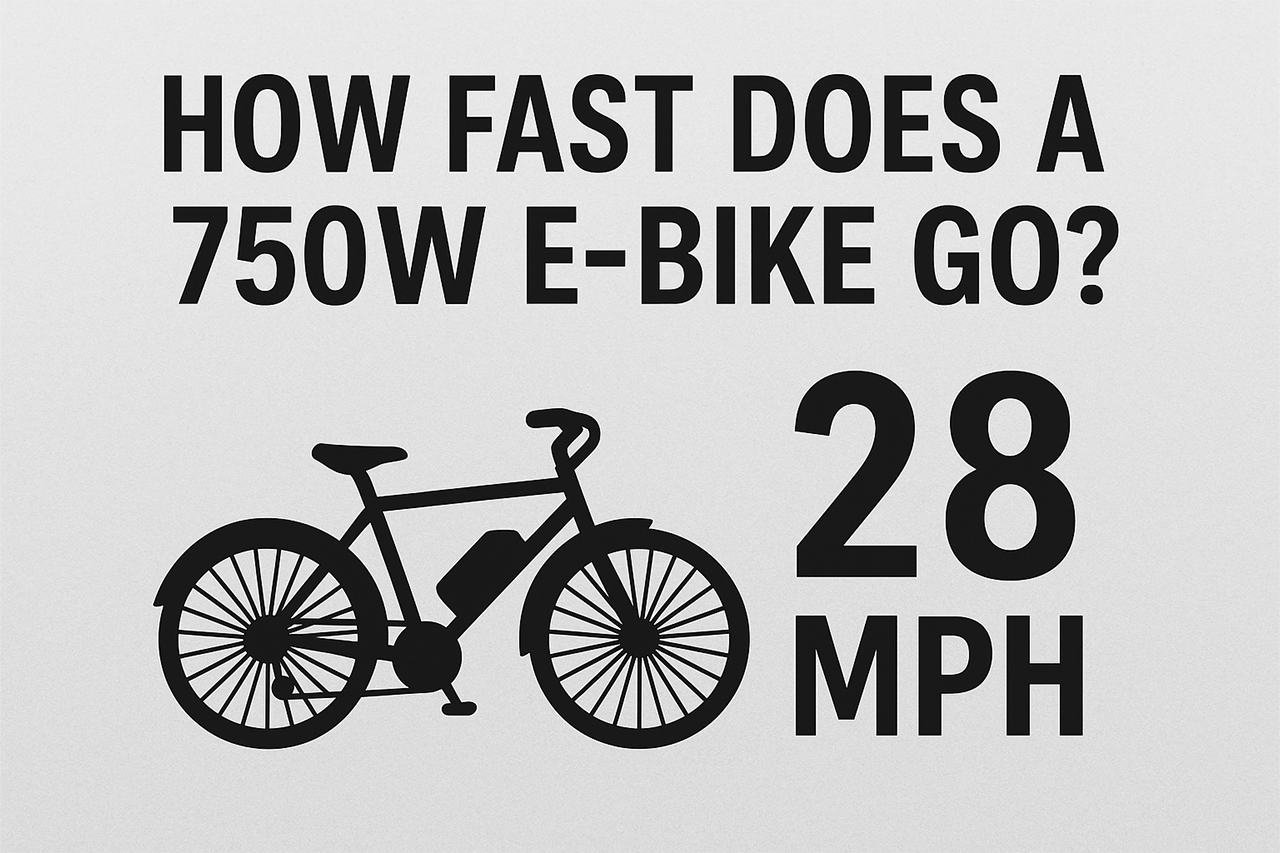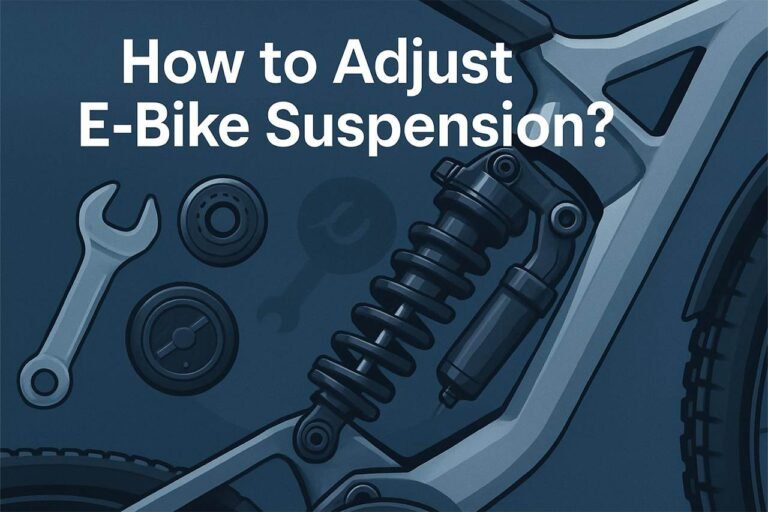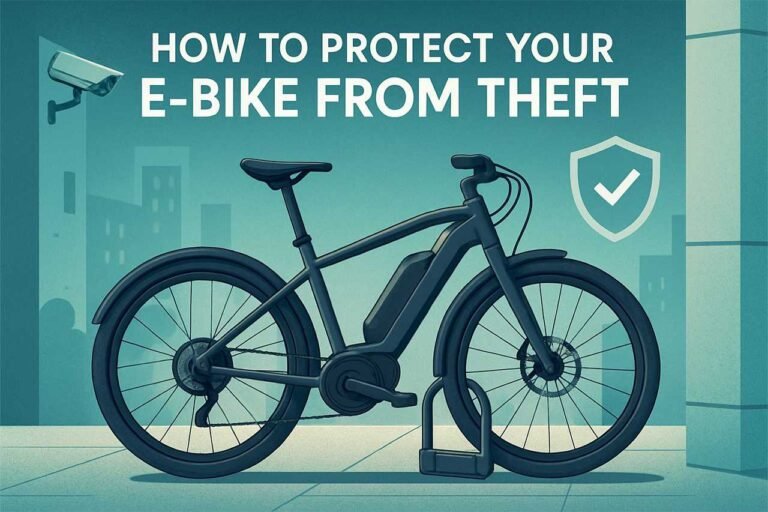
Are you wondering how fast a 750W e-bike can really go? If you’re shopping for an electric bike or just curious about what a 750-watt motor means in terms of real-world speed, you’re not alone.
A 750W e-bike typically reaches speeds of 20–28 mph (32–45 km/h), depending on factors like rider weight, terrain, battery charge, and local laws. The actual top speed can vary, but most street-legal 750W e-bikes in the US are limited to 20 mph by default for safety and compliance. Some models can go faster if the limiter is removed or in off-road settings.
In this article, I’ll break down everything you need to know about the speed of a 750W electric bike, what influences it, and how it compares to other power levels. We’ll cover typical speed ranges, factors affecting real-world performance, what 750W means in everyday riding, how laws shape top speeds, and how to get the best performance out of your 750W e-bike.
750W E-Bike Speed Explained
Let’s get right to the core: how fast does a 750W electric bike really go?
Typical Speed Range
A 750W e-bike, under average conditions and with a healthy battery, can reach speeds up to 28 mph (45 km/h) when not electronically limited. Many commuter and fat tire e-bikes with 750W motors are shipped with speed limiters to comply with local regulations, usually capping at 20 mph (32 km/h). Off-road or “Class 3” e-bikes may allow pedal assist up to 28 mph.
- On flat pavement with no wind: 24–28 mph (39–45 km/h)
- With moderate hills or heavier riders: 18–23 mph (29–37 km/h)
- With speed limiter engaged (street-legal): 20 mph (32 km/h)
- Pedal assist boost (Class 3): Up to 28 mph (45 km/h)
At a Glance: 750W E-Bike Speeds
| Setting | Speed Range (mph) | Speed Range (km/h) |
|---|---|---|
| Standard Limiter (US legal) | 20 | 32 |
| Class 3 Pedal Assist | Up to 28 | 45 |
| Off-road/No Limiter | 24–28 | 39–45 |
| Uphill/Heavy Load | 15–20 | 24–32 |
Note: Actual speeds depend on your local laws, the e-bike’s design, and riding conditions. Always check your country’s e-bike speed regulations.
What Does 750W Really Mean?
If you’re new to e-bikes, you might wonder what “750W” represents. In short: 750 watts (W) refers to the continuous power output of the electric motor.
- 750W ≈ 1 horsepower (HP)
- In e-bikes, this is the most powerful motor size allowed for street-legal riding in the United States.
- More power generally means higher potential speed and stronger hill-climbing ability.
But power does not always equal speed!
Speed also depends on gearing, tire size, battery voltage, weight, and electronic speed limiters. A 750W motor is a sweet spot for most adult e-bikes, giving you a solid mix of speed, range, and hill-climbing without tipping into motorcycle territory.
Factors That Affect 750W E-Bike Speed
A 750W e-bike can go fast, but your actual top speed will depend on a mix of factors. Here’s what you should consider:
1. Rider Weight
Heavier riders will typically see lower speeds due to increased load on the motor.
2. Battery Charge and Voltage
A fully charged battery delivers maximum voltage, resulting in peak speeds. As the battery drains, so does your speed.
3. Terrain
- Flat pavement: Best speed results.
- Hills: Speed drops, but 750W motors handle moderate slopes well.
- Off-road/trails: Lower speed due to bumps, loose surfaces, or inclines.
4. Tire Pressure & Size
Under-inflated or fat tires create more rolling resistance, which can slow you down. Keep tires inflated for top speeds.
5. Wind and Weather
Strong headwinds can easily knock 3–5 mph off your top speed.
6. E-Bike Design & Drivetrain
- Hub motors vs. mid-drive motors
- Pedal assist vs. throttle-only
- Gear ratios and cadence sensors
7. Speed Limiters & Legal Restrictions
Most street-legal e-bikes in the US are electronically limited to 20 mph (Class 2) or 28 mph (Class 3 pedal-assist). Removing limiters can void your warranty or make the bike illegal for public roads.
Quick Reference: Factors & Their Impact
- Rider weight: -2 to -8 mph
- Low battery: -2 to -5 mph
- Uphill: -3 to -10 mph
- Wind: -3 to -6 mph
- Street-legal limiter: Capped at 20 or 28 mph
How Fast Is 750W in MPH?
Let’s break down what 750W translates to in real-world riding:
- On a level road, with average rider and no speed limiter: 24–28 mph (39–45 km/h)
- With a 20 mph speed limiter (common in the US): 20 mph (32 km/h) max, regardless of power
Why the range? Because not all 750W motors are created equal! Voltage, quality, and controller settings vary widely. A premium 750W mid-drive with high-voltage battery may outperform a cheap hub motor. Think of 750W as “up to 28 mph possible,” but your e-bike’s actual speed depends on how it’s set up.
Speed vs. Power Table
| Motor Power (W) | Typical Top Speed (mph) | Typical Top Speed (km/h) |
|---|---|---|
| 250W | 15–17 | 24–28 |
| 500W | 18–22 | 29–35 |
| 750W | 24–28 | 39–45 |
| 1000W | 28–32+ | 45–52+ |
Legal Speed Limits for 750W E-Bikes
It’s essential to understand local e-bike laws to avoid fines or legal trouble.
- United States: Most states allow up to 750W for street-legal e-bikes. Class 2 and Class 3 e-bikes are limited to 20 mph (throttle) and 28 mph (pedal assist) respectively. Check your state’s e-bike laws here.
- European Union: Most e-bikes are limited to 250W motors and 15.5 mph (25 km/h). A 750W e-bike is NOT street-legal in most EU countries unless registered as a moped.
- Canada: Typically limited to 500W and 20 mph (32 km/h).
- Australia/New Zealand: Often 250–500W, with similar speed limits.
Tip: Always check your city/state rules before buying or modifying a 750W e-bike.
Throttle vs. Pedal Assist: Speed Differences
A big question is whether you reach top speed using throttle-only or pedal assist.
- Throttle-only: Usually maxes at 20 mph due to legal caps.
- Pedal Assist (PAS): Some Class 3 models boost up to 28 mph.
- Combination: Using both maximizes acceleration, but top speed is usually capped electronically.
Real-World Performance: What to Expect
Flat Road Test
- Average 170 lb rider, flat pavement, no wind:
- Most 750W e-bikes reach and hold 24–28 mph on pedal assist
- Throttle-only tops out at 20 mph (with limiter)
- With moderate inclines:
- Speeds drop to 16–20 mph, but a 750W motor provides enough torque for steady climbing
Heavier Riders
- Riders over 220 lbs (100 kg) may notice speeds closer to 18–22 mph on throttle, and 24–26 mph on pedal assist.
Battery Impact
- At 50% battery, you may see a speed drop of 2–4 mph.
- Below 20% battery, the controller may further reduce max speed to conserve power.
How Does 750W Compare to Other E-Bikes?
Here’s a quick breakdown for easy comparison:
| Motor Size | Top Speed (US legal) | Best Use Case |
|---|---|---|
| 250W | 15–17 mph | City, flat commutes |
| 500W | 18–22 mph | Mixed terrain, light hills |
| 750W | 24–28 mph | Versatile: city, hills, cargo |
| 1000W+ | 28–35+ mph | Off-road, heavy cargo, private land |
Bottom line: 750W gives you an ideal blend of power and speed for most adult riders, especially in North America.
How to Maximize Your 750W E-Bike’s Speed
Want to get the best performance out of your ride? Here’s how:
- Keep Tires Properly Inflated
- Low pressure = more rolling resistance = lower speeds.
- Maintain Your Battery
- Charge fully before rides.
- Replace aging batteries for optimal output.
- Lubricate the Drivetrain
- A clean, well-lubed chain means less energy loss.
- Ride on Smooth Surfaces
- Pavement is fastest. Gravel, grass, or sand slows you down.
- Reduce Weight
- Remove unnecessary cargo and accessories if you want max speed.
- Use Pedal Assist
- Pedaling with PAS is faster than throttle-only.
- Check for Software Updates
- Some e-bikes can have their speed or controller logic optimized by the manufacturer.
- Comply with Laws
- Don’t bypass legal limiters for public road riding.
Speed Myths About 750W E-Bikes
Myth 1: “Higher Watts Always Mean More Speed”
Not exactly. Motor efficiency, controller, and battery voltage matter just as much. Two 750W e-bikes from different brands can have very different top speeds.
Myth 2: “You Can Always Go 28 MPH”
Only if the limiter is off and your bike is designed for it. Many 750W e-bikes are capped at 20 mph.
Myth 3: “Weight Doesn’t Matter”
Heavier riders or loads will reduce your actual speed, sometimes significantly, especially uphill.
750W E-Bike Models: Popular Examples
Here are some well-known 750W e-bike models and their advertised top speeds:
| Brand & Model | Motor Type | Advertised Top Speed | Battery |
|---|---|---|---|
| Rad Power RadRover 6 Plus | Hub Motor | 20 mph (US legal) | 48V 14Ah |
| Aventon Aventure 2 | Hub Motor | 28 mph (PAS) | 48V 15Ah |
| Juiced RipCurrent S | Hub Motor | 28 mph (PAS) | 52V 19.2Ah |
| Himiway Cruiser | Hub Motor | 25 mph (unlocked) | 48V 17.5Ah |
| Lectric XP 3.0 | Hub Motor | 28 mph (PAS) | 48V 14Ah |
Video: 750W E-Bike Speed Test
If you want to see a 750W e-bike in action, check out this speed test video on YouTube (external link).
You’ll see real-world riding, acceleration, and speedometer readouts.
Frequently Asked Questions
Q: Can I remove the speed limiter on my 750W e-bike?
A: Technically, yes, but it may void your warranty and make your e-bike illegal for road use. Always check your local laws.
Q: How long will a 750W e-bike battery last at top speed?
A: Expect 20–30 miles at full throttle. Pedal assist conserves battery for longer rides.
Q: Is a 750W e-bike safe for beginners?
A: Yes, if you respect the power, follow local laws, and wear a helmet.
Final Thoughts: 750W E-Bike Speed
So, how fast does a 750W e-bike go? For most riders, expect a top speed of 20–28 mph, depending on your e-bike’s design, settings, and legal restrictions. With the right setup and good conditions, a 750W motor delivers plenty of speed for city commuting, weekend adventures, and light cargo hauling—without sacrificing safety or control.
Before you buy, always check your local laws, consider your riding needs, and test ride if you can. And most importantly—enjoy the ride!
Did you find this guide helpful? Have more questions about e-bike speeds or specific models? Drop a comment below!
This article is written for informational purposes. Always consult your local e-bike regulations and your bike manufacturer for details regarding your specific model.




